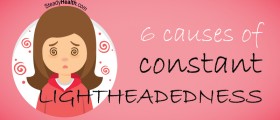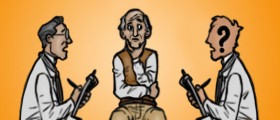so i have been getting like dizzy like if im about to faint...i've been feeling like that for like 2 months now. and i get light headed a lot sometimes i get like anxiety, and i cannot dance or play soccer which are both a big part of my life. im scared it might be something bad but i dont know whats wrong and its not anemia...i just want to be able to do the things i love without freaking out that at any given point something could happen to me like pass out...idk help me please!
Loading...
Dizziness: Lightheadedness and Vertigo - Topic Overview
Dizziness is a word that is often used to describe two different feelings. It is important to know exactly what you mean when you say "I feel dizzy," because it can help you and your doctor narrow down the list of possible problems.
Lightheadedness is a feeling that you are about to faint or "pass out." Although you may feel dizzy, you do not feel as though you or your surroundings are moving. Lightheadedness often goes away or improves when you lie down. If lightheadedness gets worse, it can lead to a feeling of almost fainting or a fainting spell (syncope). You may sometimes feel nauseated or vomit when you are lightheaded.Vertigo is a feeling that you or your surroundings are moving when there is no actual movement. You may feel as though you are spinning, whirling, falling, or tilting. When you have severe vertigo, you may feel very nauseated or vomit. You may have trouble walking or standing, and you may lose your balance and fall.
Although dizziness can occur in people of any age, it is more common among older adults. A fear of dizziness can cause older adults to limit their physical and social activities. Dizziness can also lead to falls and other injuries.
Lightheadedness
It is common to feel lightheaded from time to time. Lightheadedness usually is not caused by a serious problem. It often is caused by a momentary drop inblood pressure and blood flow to your head that occurs when you get up too quickly from a seated or lying position (orthostatic hypotension).
Lightheadedness has many causes, including:
Allergies.Illnesses such as the flu or colds. Home treatment of your flu and cold symptoms usually will relieve lightheadedness.Vomiting, diarrhea, fevers, and other illnesses that cause dehydration.Very deep or rapid breathing (hyperventilation).Anxiety and stress.The use of tobacco, alcohol, or illegal drugs.
A more serious cause of lightheadedness is bleeding. Most of the time, the location of the bleeding and the need to seek medical care are obvious. But sometimes bleeding is not obvious (occult bleeding). You may have small amounts of bleeding in your digestive tract over days or weeks without noticing the bleeding. When this happens, lightheadedness and fatigue may be the first noticeable symptoms that you are losing blood. Heavy menstrual bleeding also can cause this type of lightheadedness.
An uncommon cause of lightheadedness is an abnormal heart rhythm (arrhythmia), which can cause fainting spells (syncope). Unexplained fainting spells need to be evaluated by a doctor. You can check your heart rate by taking your pulse .
Many prescription and nonprescription medicines can cause lightheadedness or vertigo. The degree of lightheadedness or vertigo that a medicine causes will vary
Loading...
















